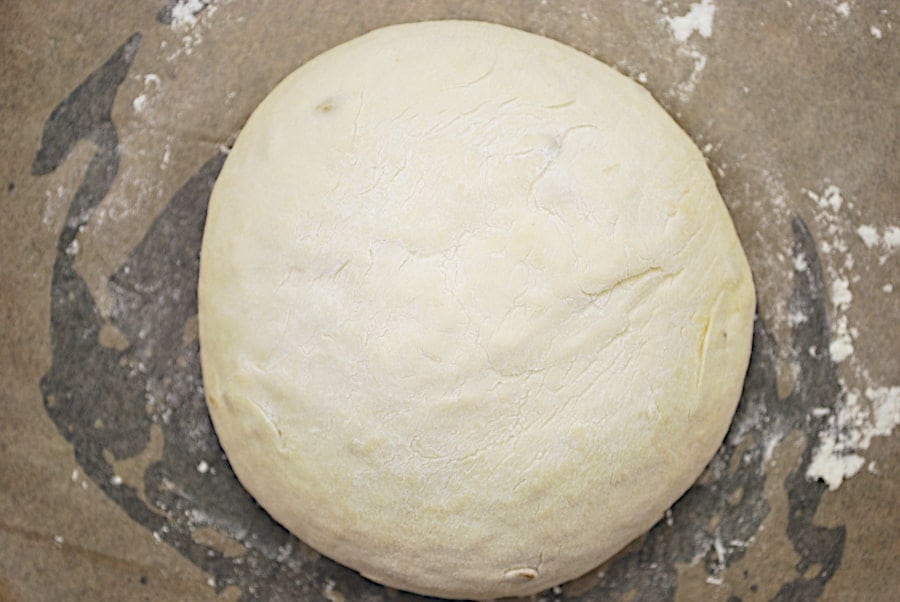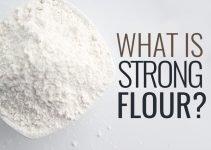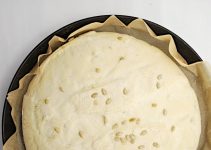When we’re talking about the best baking stones for bread or any baking stones, we’re referring to a hard surface that radiates intense heat.
You might also know them under the name of pizza stone, they’re one and the same.
Contents
Top Baking Stones for Bread
1. Top Recommendation: Lodge P14P3 Cast Iron Baking Pan
This is not a baking stone, it’s actually an amazing cast iron baking pan. It’s still my top recommendation because it’s so versatile, durable, has handles, and works on any surface. At 14-inch it can fit in plenty of home ovens. Plus, you just have to preheat it for 10-15 minutes.
2. Overall Best: Heritage Pizza Stone
This is a 15 inch rectangular baking stone for bread made of ceramic, non-stick, quite durable, and had a good price. The interesting feature is that it should preheat twice as fast as the other models.
3. Best Cordierite: Honey-Can-Do Oven Round Pizza Stone
It’s pretty big at 16-inch but it has a nice 1/2 inch thickness. If you handle it with care, it will last a very long time. When you get it, make sure to follow the instructions to get it ready for baking, some users have complained about the smell so, that’s a bit of a con.
4. Expensive Baking Steel: NerdChef Steel Stone
This is one of the heaviest thickest baking steels. If you can handle the 32 pounds and the price doesn’t scare you, you can definitely consider this baking steel as your best baking stone for bread. It’s a 14.25 by 16 inches rectangle made of steel.
Baking Stones for Bread Reviews
All these best baking stones for bread are called pizza stones but they will bake bread perfectly, as well. I love these choices, I hope you will find something that works for your kitchen.
1. Lodge Pre-Seasoned Cast Iron Baking Pan With Loop Handles, 14″
This cast iron baking pan might not be what you were expecting to find when you decided to search for baking stones for bread but it’s an excellent kitchen tool for baking and cooking and for using on the grill.
The variety coupled with the quite affordable price and the high quality, all these factors make this cast iron baking pan the perfect replacement for a best baking stone for bread.
It would be amazing if you could get it on sale, the price is pretty sweet.
It’s also so much easier to use and maintain and handle. Let me tell you all about it.
Main features
First thing first, it’s slightly smaller, with a 14-inch diameter. Pizza stones usually measure 16 inches, although the cheaper ones also come in the 14-inch size, like our cast iron baking pan here.
It does have one very useful thing that baking stones don’t have: loop handles. Those handles are such a welcome sight for my eyes. Well, I’m pretty clumsy and not the strongest person on the planet at 115 pounds.
And it only weighs 9.5 pounds so it can be easily handled by pretty much anyone.
I’m pretty sure I don’t have to explain what cast iron is and how durable it is. Future generations could inherit this baking pan.
The amazing part about it is that it bakes exactly as a pizza stone does but it doesn’t require the same 45-60 minutes of preheating in the oven.
This baking pan only needs to be preheated for about 10-15 minutes, it will reach 400 degrees in 4 minutes, and can withstand temperatures well over 700 degrees.
You can use it to bake back-to-back pizzas, it won’t cool down. The same goes for how many breads you have the energy to bake.
Once you’re done with it, turn the oven off and let it inside until it has cooled down.
The maintenance part is not complicated: wash it with soap, dry it completely to avoid rusting, and then rub it with vegetable oil.
The Lodge Pre-Seasoned Cast Iron Baking Pan is simply fantastic for baking and it’s one of the most popular and praised of the bunch.
2. Heritage Pizza Stone, 15 inch: Best Baking Stone for Bread
My first recommendation for the actual best baking stone for bread is actually one made of ceramic. You might already know that cordierite is an awesome material that pretty much everyone recommends.
Even so, this ceramic stone is actually impressive, durable, and one of the most affordable on the market.
It pretty much meats all requirements. Unfortunately, it only comes in a 15-inch size, rectangular shape. There might be some people who might need a smaller size. That means that you’ll have to go for a cordierite stone, which can be found in a smaller size.
The advantages with using this ceramic best baking stone for bread are:
- Heritage tells us that their stones can preheat twice as fast as the others
- cast from black ceramic and protected by heat resistant coating, reasonably durable
- non-stick
- it can still easily break so make sure to handle it with care, don’t drop it
3. Honey-Can-Do Oven Round Pizza Stone, 16″: Best Cordierite
This is an excellent cordierite baking stone for bread and pizza. It’s quite good and the price is pretty good. Pay attention to where you buy it from because it should definitely be quite affordable.
It’s a 16 inch round stone, looking like a proper baking stone, just like you imagine one would look like.
What makes this cordierite baking stone stand out is the quality and the thickness. This is quite a thick stone, 1/2 inch thick, that can easily perform consecutive bakes.
For any stone, if you want to do consecutive bakes, just leave it in the oven for 5-10 minutes to get back to its original stored high heat.
Since it’s made of cordierite, it handles extreme temperatures without any risk of cracking. It doesn’t necessitate being handle gently but still be careful with it.
To prevent the dough from sticking to the stone, use flour, cornmeal or parchment paper. Just assume that it will stick and don’t try it bare.
It has a porous surface that allows the moisture to escape, preventing a soggy crust.
When you get it, you have to wash it with water quite thoroughly and leave it to dry or dry it with a towel. Not a paper towel, that will catch in the porous surface. After that, heat it in the oven for 30 minutes. Hopefully, there will no smell coming out. If there’s a smell, I would recommend returning it. Some users have complained about a chemical smell, which is unfortunate.
They also have a 14 inch option.
4. Geebobo Pizza Stone for Oven and Grill: Small Baking Stone for Bread
The Geebobo is a wonderful choice as one of the best baking stones for bread. But that’s not the reason for which I decided to recommend it.
I just wanted to also include as 12-inch round stone for those who don’t own huge ovens. Or maybe for those who want to use one in an air fryer.
It has a 0.35 inches thickness. It goes well with this size.
They also have a 10-inch model.
Other than that, there’s not much that I can add. It’s made of cordierite, it’s very good for baking breads and pizzas, but handle it with care if you don’t want to break it.
The price is pretty affordable. You can use it in ovens, on the grill or on the stovetop.
5. Top Notch Kitchenware Modular Baking Steel
Before reviewing one of the most impressive baking steels for bread, I want to first recommend something a bit more affordable. Like maybe in the same price range as the above best baking stones for bread.
Considering that it pretty much costs half of what the average baking steel costs, the question is: do you go for it or go for the sure thing and pay twice as much? Let’s see what it offers.
First of all, I really like that it’s smaller than the rest. It measures 13″ x 9.75″ x 0.25″ thick. Those with smaller ovens might find this size to be a good fit.
The thickness is not surprising, given the affordable price. It just means that you won’t have to preheat it for too long.
The manufacturer also mentions that you can purchase 2 of these and place them side by side if you want increased cooking space and you have an absolutely huge oven.
Follow the instructions when you get it and then you’re good for baking, this steel will last a lifetime.
6. NerdChef Steel Stone: Best Baking Steel for Bread
My last choice for you is definitely something special for quite a few reasons.
The NerdChef Steel Stone is a steel baking stone for bread and one of the most expensive baking stones on the market.
It’s also one of the thickest at 0.50 inches thick. Its dimensions are 14.25 x 16 x 0.5 inches.
Due to that impressive thickness, it weighs quite a lot – it weighs 32 pounds. That’s not a comfortable weigh for someone like me. Just imagining cleaning this thing makes my wrists scream.
Since it’s quite thick, the preheating time should last at least an hour, for the best results maybe even an hour and a half. You can leave it in the oven once you’re done, you won’t be able to touch it for a couple of hours.
It’s a baking stone made to satisfy even bakers with the highest expectations.
Best Baking Stones for Bread Buying Guide
There are a few simple criteria to keep in mind when shopping to the best baking stones for bread.
Materials
As you might have noticed, I have an affinity for metals. That’s because hard metals, like iron or steel, are extremely durable. Basically, this is an investment that you make for life. And you don’t have to be careful with these heavy kitchen tools. They’re also easier to maintain.
Obviously, besides steel, there is another material that is even more popular and more often encountered.
Most pizza stones are actually ceramic or cordierite baking stones. They have the advantage of being slightly more affordable, especially the ceramic ones.
If you don’t want to get one made of steel, choose a cordierite one.
Cordierite baking stones are also highly durable. It’s a material that can withstand very high temperatures without a crack. And it can also handle going from a low temperature to a high temperature without problems.
Ceramic stones, unless mentioned otherwise, have to be handled with a lot more care to prevent cracking.
Size
If you have a smaller oven, a 14-inch size might be preferable because there needs to be about 1-inch space between the stone and the walls.
Countertop pizza ovens can also benefit from the addition of a baking stone but most will only handle up 12-inch.
As you can see, choosing the right size is a job that you have to take care of, depending on your oven.
Shape
The round shape is also better for smaller ovens.
But the rectangular shape offers more baking space, especially for those looking to often bake breads on them.
Thickness
One last thing that you need to keep in mind is that the thickness matters. The thicker a baking stone is the longer it has to be preheated.
The thickness starts from 1/4 inches up to 1/2 inches or even 3/4 inches thick. 1/2 inches is the most prevalent option.
Cleaning
The ones made from steel are very easy to maintain. You can wash them with soap, you can even use a dough scraper to remove any debris, just make sure to completely dry them with a towel after washing them to keep them from rusting. You can store them in the oven, just leave them there even when you’re cooking something that doesn’t require a stone.
The ones made of cordierite should never be washed with soap, just plain water and dried with a towel after. Clean them only once they’ve cooled down completely.
If you want to avoid all that, just use parchment paper and you’ve saved yourself quite the trouble.
You should also never use oil on a baking stone.
You should always place your stone in a cold oven when you’re ready to start the preheat process.
Cordierite baking stones shouldn’t be washed with soap because of their porous nature.
Why we should use a baking stone for bread
The whole purpose of these baking tools is to generate a high amount of heat in a traditional oven.
Baking stones don’t make the entire oven hotter, their surfaces are the one that radiate that heat. They bake the products placed on them with a very crispy crust and a moist interior.
The baking goods, pizzas or breads or flatbreads, are placed directly on the stone. You can cover the stone with parchment paper or sprinkle with flour or cornmeal to prevent any dough from sticking to the surface. But there’s no pan involved.
The best baking stones for bread are substitutes for Dutch ovens or other bakeware. While using a Dutch oven to bake bread emulates the baking conditions found in professional bakeries, using a pizza stone comes very close to getting the same results. So, they’re as awesome for bread as they are as pizza makers.
If you don’t have access to a wooden/gas oven, which can be made to reach extremely high temperatures so that a pizza is done in at most a couple of minutes, a pizza stone is your next best choice.
It won’t have that same delicious wooden oven flavor, that unique aroma, but it will still look and taste delicious. And the pizza even with a baking stone won’t be baked in a couple of minutes
It will still take about 8-10 minutes for the pizza to be cooked, depending on the oven, but the quality of the crust is top-notch.
What Breads Can You Bake on Baking Stones?
When using a baking stone there’s just one thing you have to keep in mind: the high heat that these stones store and emanate.
The heat is distributed evenly so the cooking is consistent and you won’t need to turn the bread around multiple times to ensure an even cooking.
Preheating baking stones
In order to store the heat, they must be preheated for anywhere from 30 minutes, 45 minutes, an hour or maybe even more, it depends on the thickness of the stone. You will find precise instructions for each model so, you should definitely read those carefully.
Do you always have to preheat baking stones? There’s only one answer to that: yes.
If you don’t preheat them at high temperatures of 400-500 degrees Fahrenheit, they won’t have any heat stored in them in order to cook the dough evenly, while giving it a divine crust.
That’s why I said that they’re not as easy to use as a loaf pan. There are extra steps involved and you have to include the preheating time into your schedule.
We’re already used to preheating ovens for basically everything we bake, a baking stone just takes a bit longer to reach that high storage of heat. And it won’t lower the overall temperature of the oven, it doesn’t work that way.
Types of breads baked on a baking stone
So, let’s get back to our question. What kind of breads can be baked on a baking stone?
All types of breads as long as you’re looking for a very nice crust. Basically, every type of bread that you might want to make:
- artisan breads
- baguettes
- gluten free breads
- sourdough bread
- pita bread
The baking time will be almost the same, baking stones for bread don’t speed up the process, they just make the finished product more delicious.
Just make sure to check the bottom at least once to prevent it from getting more well-done than you’d prefer.
Use parchment paper/flour/cornmeal
When you’re transferring the dough to the baking stone, in order to avoid the dough sticking to the stone, you can add parchment paper or you can sprinkle the stone with flour or cornmeal. The part with using parchment paper might be easiest and a sure way that no dough will stick anywhere for you to clean afterward.
Some baking stones are not the easiest to handle when it comes to cleaning and maintaining them.
You can also add boiling water inside the oven during the baking process, you can pour one cup boiling water into a cast iron and place it on the bottom. It will create steam, which can lead to a greater rise, an open crumb, and a fantastic crust.
The only thing you can’t make are pastries, they will get burned quickly. Breads with a high content of sugar are also not a good idea. Also, no pie baking.
Baking Stones for Bread: Do You Need One?

While you should definitely consider getting a baking stone for pizza making, you can bake breads without one.
Just a simple oven will do and it will be delicious. If this is the route you’re choosing to take, a good loaf pan will come in handy. Or you can use a sheet pan and bake round loaves, baguettes or braids.
There are so many options when it comes to bread baking, just as there are many options when it comes to making the dough: you can use your hands, a mixer, or skip doing the whole work and just use a bread machine.
However, there are options for the best baking stones for bread. What exactly can they do when it comes to baking breads?
The role of a baking stone
Baking stones for bread will do the same thing that they do for pizza baking. The bread will be cooked at a higher temperature, the moisture from the dough will be absorbed, and the crust will be crispy while the whole bread is evenly cooked.
After all, there are no separate pizza stone and bread baking stones. They’re all baking stones that are more frequently used for making pizza at home and that’s why we know them as pizza stones but, once someone buys one, they end up using them for baking bread, as well, and they end up getting addicted.
With that being said,
My answer to the question do you need a baking stone for bread is a bit more complex.
You don’t actually need one but you would love using one. They’re not as practical and as simple to use as a loaf pan or a sheet pan so, you need to consider those aspects, too.
The idea is: if you’re a huge pizza lover and you love making it at home quite often, investing in a very good baking stone would be awesome and you will have the bonus of baking breads on it, too.
Read on to discover more about baking stones for bread and pizza, how they should be used and maintained, how much they cost and all that stuff, these are all aspects that you should consider.
Baking Stones for Bread Substitutes
As you’ve already saw above with my choices for the best baking stones for bread, I didn’t go the traditional route. I first chose to recommend you a cast iron baking pan that acts like a pizza stone without the very high price and the hassle.
Since I opened that route, I thought it would be best to take it even further and talk some more about other alternatives for baking stones. You might find something helpful here if the above choices weren’t able to meet your expectations.
Loaf pan/Sheet pan
A sheet pan or a loaf pan is not exactly a substitute to baking stones but these are still good options for baking that can yield delicious results.
Dutch oven
Using a Dutch oven is actually the perfect substitute to baking stones because it creates a similar crust and the same even cooking.
The result might even be better with a Dutch oven because there’s no risk of a burnt bottom.
Usually, Dutch ovens need to be preheated for 25-35 minutes for a good heat distribution so, even this step is something they have a bit of in common.
You can’t make pizza or baguettes but you can cook food and fry meat in a Dutch oven so, even if the price is high it can be used daily.
If you’re interested in knowing more about Dutch ovens and exactly how baking in one is like, check out my post on the best Dutch ovens for bread.
Bread cloche
The other alternative is a bread cloche, which is another cooking tool that consists of two parts, a base and a dome. The difference is that the cloche has a very low base, is definitely designed just for baking and not mainly for cooking, like the Dutch oven is.
The low base allows for an easier placement of the dough but the price is quite high.
As you can see, the world of baking and cooking abounds in very interesting, highly useful, not exactly cheap baking tools. These baking stones for bread that I’ve reviewed in this article are worthy of their popularity and they manage to fit a variety of budgets.




